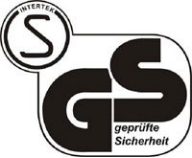The Acquisition Of GS Certificate
GS mark is a safety certification mark issued by TUV, VDE and other institutions authorized by the German Ministry of Labor.

GS means German "Geprufte Sicherheit" (safety certified), and also means "German Safety". GS certification is a voluntary certification based on the German Product Safety Act (SGS) and tested in accordance with the European Union unified standard EN or German industrial standard DIN. It is a recognized German safety certification mark in the European market.
Certification Process
- At the first meeting, the testing agency or agency will explain the specific certification procedures and relevant standards to the applicant's product engineer, and provide the required documents and forms.
- The applicant shall submit the documents that meet the requirements. For electrical products, it is required to submit the general assembly drawing, electrical schematic diagram, material list, product purpose or use and installation instructions, and the difference between series models and other documents.
- After inspection of the applicant's documents, the testing agency will arrange a technical meeting with the applicant's technical personnel.
- The sample test shall be carried out in accordance with the applicable standards, which can be carried out in the manufacturer's laboratory or any laboratory of the inspection agency in various countries.
- GS certification requires that the production site be checked for safety-related procedures.
- Issue GS certificate.
Certification Role
The GS certification mark indicates that the use safety of the product has passed the test of an independent agency with public credibility. Although the GS certification mark is not a mandatory requirement by law, it can make the manufacturer subject to strict German (European) product safety laws in case of accidents caused by product failure. Therefore, GS certification mark is a powerful market tool, which can enhance customer confidence and purchase desire. Although GS is a German standard, most European countries agree with it. Besides meeting the GS certification, the product will also meet the requirements of the CE mark of the European Community. Unlike CE, the GS certification mark has no legal mandatory requirements, but because the safety awareness has penetrated into ordinary consumers, a product with GS certification mark may have greater competitiveness in the market than ordinary products.







